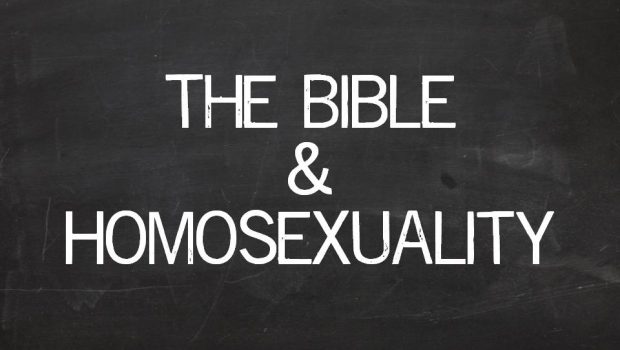The Bible and Homosexuality
The question of what the Bible teaches regarding homosexuality is one of tremendous importance and heated dispute in the current era. An increasing number of professing Christians are questioning traditional teaching on this topic, and the culture at large has strongly rejected traditional Christian teaching on it. Nonetheless, it is my contention that this questioning is not based on the biblical text, but is based on cultural predispositions to reject any form of sexual constraint. Among professing Christians the key question must always be “What does the Bible teach?” We are not permitted to disregard Scripture on a cultural whim.
The Argument from Tradition
Before looking directly at the Bible and what it says on homosexuality, it is worth noting that this has not traditionally been a point of contention among Christians. On the whole, orthodox Christian believers throughout the ages have taken it as obvious that the Bible forbids homosexual behavior. A debate on this topic is actually a very new phenomenon.
While tradition is not by itself definitive, it is useful. As modern Christians, do we really believe that the likes of the Didache, Justin Martyr, Clement of Alexandria, Tertullian, Eusebius of Caesarea, Basil the Great, John Chrysostom, Augustine, Thomas Aquinas, and the official teachings of the Catholic and Orthodox churches have been consistently and unanimously wrong for approximately 2,000 years? If church tradition cannot be trusted with testimony so strong and consistent on this topic, then it cannot be trusted on any topic. As Christians who believe in the communion of saints, we should be very hesitant to break fellowship on this issue with the likes of Justin Martyr, Augustine, and Aquinas.
Additionally, we should presume then when a list of such intelligent men, including many of the greatest figures of Western philosophy and theology, all concur on a topic it is unlikely that they are wrong. One great mathematician may work out an equation and get a wrong answer. But if all of the world’s great mathematicians worked on the same equation, over the span of several centuries, and they all tended toward one answer to the equation, we would assume that such an answer is correct unless there is overwhelming evidence to the contrary.
The Argument from Scripture
This brings us to the second argument that homosexuality is a sin. If the church’s great theologians and philosophers were wrong on homosexuality, what authority would furnish enough evidence to overthrow their weighty and well-supported position? For professing Christians it could only be the ultimate authority of God’s Word found in Scripture. If Scripture is shown to permit homosexuality, then there would be sufficient reason to disregard the weight of tradition and follow Scripture.
One point must be made here, and that is that an argument from silence will not suffice for the advocate of homosexuality. That is, it is not enough to say “Scripture is silent on this issue.” Scripture is silent on the issue of torturing puppies and drowning kittens, as it turns out, but none of us take this silence as moral warrant for engaging in such behavior. Rather, we recognize that in light of the virtues Scripture advocates and the moral law it assumes that such actions as torturing puppies are forbidden despite the fact there is no command “Thou shalt not torture puppies.” God has instilled a moral law in the nature and fabric of the universe itself (because such a law is inherent in God Himself), and this law makes it obvious to us that the biblical teaching about stewardship prohibits us from needlessly torturing puppies or drowning kittens.
Thus, even if Scripture is silent on homosexuality, and contains no commands forbidding it, this does not warrant the conclusion that homosexual behavior is morally permissible. Rather, I would continue to argue, based on God’s design in creation in Genesis 1-2, that monogamous heterosexual relationships are the ideal God has established. As such, lacking any specific positive indication of God’s approval of homosexuality, we should presume heterosexuality as the moral norm based on creation.
However, we can go even further. For Scripture is not silent on homosexual behavior. And in contrast to commending it, I believe Scripture positively condemns it. Here I will begin with Leviticus 20:13, “If a man sleeps with a man as with a woman, they have both committed a detestable thing. They must be put to death; their blood is on their own hands.” (HCSB). If the surrounding context does not make clear that sexual relations are in view in this verse, I will point out that the Hebrew word for “sleeps with” or “lie” is “shakab.” It has the Qal stem which can be used, along with the Niphal and Pual stems, to refer to sexual relations. The term is clearly used in this sexual sense (Qal stem) in Genesis 19:32-38. The relationship in view is clearly Lot and his daughters. In that case the relationship is incestuous, but the use of the same term (Qal stem) in Genesis 30:15 demonstrates that the incest is incidental to the use of “shakab” in a sexual sense.
With that said, the actual grammar of Leviticus 20:13 does not allow or permit any sort of speculation about temple prostitution, and it makes no mention of multiple partners. It merely refers to sexual relations with a man “as with a woman.” Advocates of homosexual behavior who believe the Bible only condemns polygamous homosexual relations or temple prostitution are not reading this verse in its historical and grammatical context.
Some may say that this is an Old Testament command by which we are no longer bound. I dispute that point. The surrounding context contains many moral injunctions by which we still consider ourselves bound. For example, Leviticus 20:1-7 condemns the worship of Molech and child sacrifice. Leviticus 20:15 condemns bestiality. We still recognize the moral legitimacy of bans on child sacrifice and bestiality. To say Leviticus 20:13 no longer has any moral weight is to make a special pleading for no apparent reason whatsoever, it is to read the moral injunctions of the Old Testament entirely inconsistently.
The Old Testament clearly condemns homosexual behavior. But what of the New Testament? Two commands are particularly important, 1 Corinthians 6:9 and 1 Timothy 1:10. Paul actually coins a new term, “arsenokoites” that is used in both of these verses. This term is translated as “homosexuality” (HCSB) If Paul were referring merely to temple prostitution or some other common cultural practice, it would make more sense for Paul to simply use an existing and accepted term (as such terms were available).
But that point aside, I prefer to work with the actual grammar and avoid speculation as much as possible. What do we know about this term that Paul coins? First, it is a conjunction of two terms, “arseno” and “koite.” Second, these two terms are used in the Septuagint to translate Leviticus 20:13.
The Septuagint is a Greek translation of the Hebrew Old Testament. It was common in Paul’s time, and was often the preferred text for the authors of the New Testament. We have already shown that, in Hebrew, Leviticus 20:13 clearly refers to homosexuality. Literally, the phrase “arseno koite” refers to a man lying (sleeping) with a man.
Supposing that Paul is writing to a Greek church with a Jewish background in Corinth, and a Greek believer in Timothy, we could assume that these people were familiar with the Septuagint. In fact, it may have been their only access to the Old Testament (though many people were multilingual, so we have to be careful saying they did not speak Hebrew).
If Leviticus 20:13 forbids homosexuality, and the linguistic evidence strongly indicates that it does, and 1 Corinthians 6:9 and 1 Timothy 1:10 conjoin the translation of this verse from the Septuagint, the most reasonable understanding is that 1 Corinthians 6:9 and 1 Timothy 1:10 forbid the same thing found in Leviticus 20:13. They just happen to do it in Greek and not Hebrew.
Objections
Given such strong historical and linguistic evidence that the Bible does condemn homosexual behavior, there are certain objections that must now be considered:
Objection 1: “You’re just a homophobe who can’t stand people different than you.”
Response: This type of rhetoric is entirely useless in a fair-minded and rational ethical discussion. Supposing someone is a homophobe, it does not follow that they are wrong in every single ethical judgment. Even homophobes may be right about certain ethical matters. One’s motivation for believing something is often irrelevant to the truth or falsity of the belief in question.
With that said, I’m not a homophobe. The only person making unfair characterizations and biased statements without evidence is the name-caller, and I am not the one who has been calling names.
Objection 2: “Jesus never said anything about homosexuality.”
Response: Jesus never needed to say anything about it. No one in Jesus’ sphere of influence ever questioned the morality of homosexual behavior. It is one of a very few things the Pharisees, Sadducees, and Jesus could all agree on.
Additionally, Jesus did esteem the Old Testament law, and live according to it on every point. Jesus taught the Old Testament as a whole is true, so outside of Him abrogating what the Old Testament says about homosexuality (and He never does), we should assume He agreed with it.
Objection 3: “People are born gay, you can’t choose your orientation.”
Response: The scientific evidence is still out on this issue, despite people shouting loudly to the contrary. Even so, I have tried to be careful and use terms like “homosexual behavior” when appropriate. This is because I want to distinguish between what may be an un-chosen sexual attraction, and a chosen sexual behavior and identity.
I have no doubt that some people have involuntary attractions to members of the same sex. But this does not mean these people must act on those attractions. Heterosexual men are forbidden from acting on all of their sexual attractions except one, namely that attraction within marriage.
This is really the fundamental issue in this debate. What is the source of our identity? As Christians, we seek to allow Christ Himself to be the source and ground of our identity, even as we must deny our very selves to do this. The problem with those advocating homosexual behavior is that they are ultimately idolaters. They say that an internal predisposition should be followed over the demands of Christ. If Christ is who He says He is, we should subjugate every desire we have to His will and way. This is true not only of homosexuality, but of theft, violent tendencies, heterosexual desires outside of marriage, etc. We all must choose to either follow Christ or to follow our own evil inclinations.
Objection 4: “God is love.”
Response: This is true, but God’s love cannot be ripped away from His holiness. Love always has a moral component. The question is not whether God is love, but whether God in love has actually forbidden homosexual behavior. I answer that God has done so, and He has done so knowing that what He offers in exchange for self-denial in sexuality is far greater than what could be obtained by following our sinful inclinations.
Objection 5: “God wouldn’t send anyone to hell, even homosexuals.”
Response: God certainly desires that people not go to hell. God even sent Christ to provide a way to be spared from His wrath. But God will act justly, and if we refuse, despite all of God’s efforts, to repent of our sin, then our going to hell is not God’s fault.
God expects us to repent (turn away from) our sin, and believe in Christ for salvation. Our repentance may not be perfect immediately. We will stumble and fall many times, this is true of those struggling with same-sex attractions, just as it is true of those struggling with any other sin. God is merciful, and if we persist in repenting, if we continually turn from our sin to Christ, victory over that sin is attainable. It will be all the sweeter for the effort put in to it.
Someone struggling with homosexuality should repent and believe, just as a liar should. God is equally gracious and merciful, despite the particular sin. But those who refuse to turn away from sin will get exactly what they want, they will live with their sin for eternity. And they will do this in hell.










